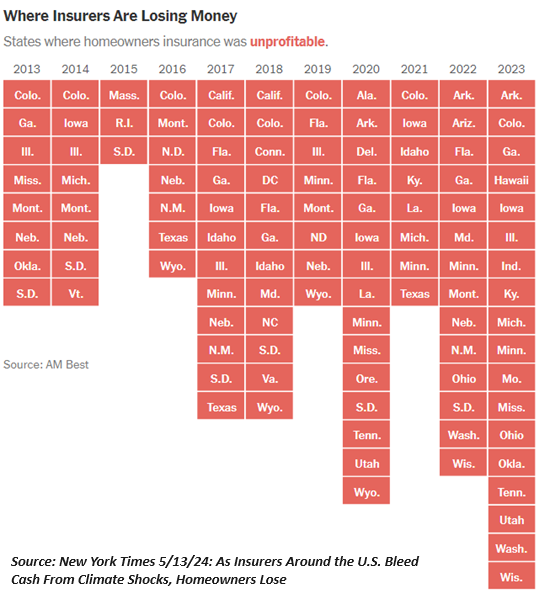The 8 Essentials We Need to Control
You are receiving this post/email because you are a patron/subscriber to Of Two Minds / Charles Hugh Smith. This is Musings Report 2024-46.
I often reference our dependence on long supply chains and complex systems whose apparent robustness in normal operations masks their inherent fragility and vulnerability to collapse when put under pressure by an out-of-the ordinary event. This fragility is the result of the global imperative to optimize every supply chain and system for efficiency and cost in normal operations, which requires stripping out costly redundancies and back-up systems.
Against this backdrop of illusory low-risk stability, we need some control over these essentials of life:
1. food
2. water
3. shelter
4. fuel / electricity
5. sanitation
6. mobility
7. health
8. money
I've also noted that the insurance industry in not a charity. Their job is to minimize exposure to risks that could generate claims, minimize claim payouts and increase rates to cover projected losses and generate a profit.
This makes the insurance industry an accurate proxy for systemic risk. If insurers are paying out tens of billions of dollars in claims and jacking up rates / abandoning markets to reduce exposure to unacceptably high risks, this tells us something important about systemically rising risk.
Consider this chart of the insurance industry's heavy losses in U.S. states. Notice the list of states hit by severe losses has grown long.
The list of "impossible" disasters which have struck towns and regions is lengthening to a sobering degree. That the town of Lahaina (Hawaii) was at risk of burning down was incomprehensible, as was the damage done to Asheville (North Carolina). The "impossible" is rapidly becoming "the new normal," which is why insurance companies are fleeing entire regions, demanding homeowners reduce risks or face cancellation of their policies and raising rates across the board.
The insurance industry is an accurate proxy for systemic risk because it deals in dollars and risk, not opinions about the causes, which have zero influence on the realities.
With roughly 80% of the population living in urban zones, there are obvious limits on most households' ability to replace long supply chains and complex systems. But that doesn't mean urban/suburban households can't take some measure of control over these 8 essentials. Having some control is far better than zero control, where our lives are literally leaves blowing in the wind.
When it comes to these essentials, half-measures and "life hacks" are not replacements for doing the real work required.
So where do we start? How about taking control of what it takes to live for a week without utilities and access to stores, and having the means to respond to whatever crisis disrupted supply chains and infrastructure?
CHS NOTE: I understand some readers object to paywalled posts, so please note that my weekday posts are free and I reserve my weekend Musings Report for subscribers. Hopefully this mix makes sense in light of the fact that writing is my only paid work/job. Who knows, something here may change your life in some useful way. I am grateful for your readership and blessed by your financial support.
Keep reading with a 7-day free trial
Subscribe to Charles Hugh Smith's Substack to keep reading this post and get 7 days of free access to the full post archives.


